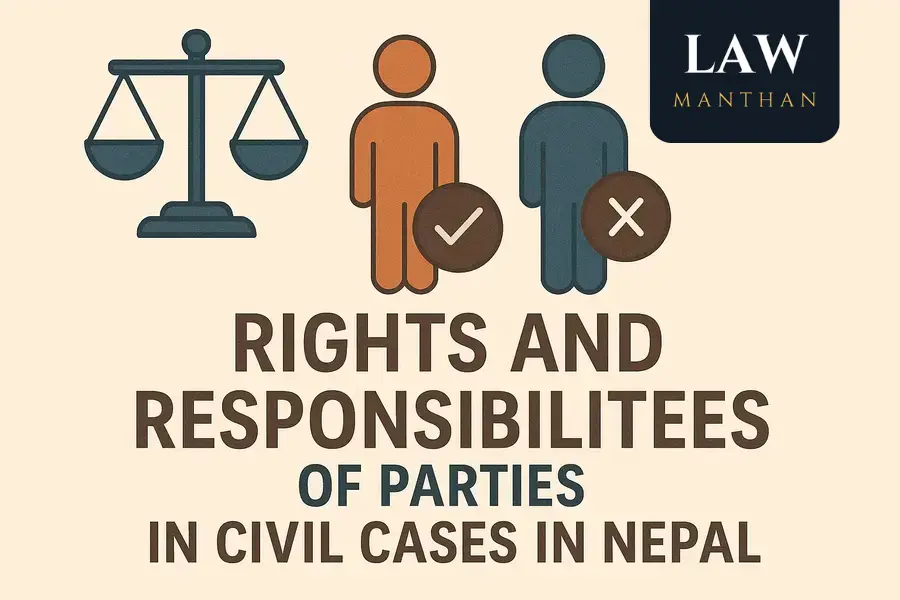In any civil case, both the plaintiff (the party bringing the claim) and the defendant (the party responding to it) hold several rights and responsibilities under Nepal’s legal system. These rights ensure fairness and justice, while responsibilities promote discipline, honesty, and respect for the law.
To begin with, both parties have the right to access justice. This means anyone who feels their civil rights have been violated-whether it’s related to family, property, contract, or any personal dispute-can approach the court for legal remedy. Nepal’s Constitution and the Civil Procedure Code, 2074, guarantee that individuals will not be denied their right to be heard by a competent, impartial, and independent court.
Both parties also have the right to legal representation. They can appoint a lawyer to argue on their behalf, prepare legal documents, and present evidence. If someone cannot afford a lawyer, there are provisions for free legal aid, especially for women, children, marginalized groups, and the poor.
Another important right is the right to be heard and present evidence. Each party is allowed to submit relevant documents, call witnesses, and question the other party’s witnesses through cross-examination. The court evaluates the presented facts before making a decision. This right ensures that both sides of the story are considered.
Parties also enjoy the right to appeal. If either party believes that the decision of the trial court is unfair, they can challenge it in a higher court. Unlike a common misunderstanding, it’s not only the losing party who can file an appeal; even the winning party can appeal if they are dissatisfied with certain parts of the judgment, such as the awarded compensation being less than what was claimed.
Now, with these rights come responsibilities. Every party must perform their duties sincerely and honestly. One primary responsibility is the duty to tell the truth. Parties must not submit false evidence, make misleading claims, or lie under oath. Doing so may result in criminal charges like perjury or obstruction of justice.
Parties also have the responsibility to follow court orders and timelines. This includes submitting documents on time, attending hearings, and not violating interim court orders like injunctions or stay orders. Failure to follow court procedures can delay justice and may even result in penalties or dismissal of the case.
Another essential duty is the obligation to act in good faith. Civil cases are often about restoring broken rights or relationships. Whether it’s a family matter like divorce or a property dispute among siblings, the parties are expected to cooperate with the court and not misuse the legal process just to harass the other party.
Furthermore, both the plaintiff and the defendant have a duty to respect the final judgment. Once a judgment becomes final (i.e., not under appeal), both parties must comply. If the court orders payment of compensation, return of property, or performance of a contract, the parties must act accordingly. Willful disobedience may lead to enforcement measures, including seizure of assets or even contempt of court proceedings.
In civil mediation or settlement efforts, the parties also have the responsibility to engage genuinely. Courts in Nepal often encourage parties to resolve their disputes through mutual understanding. This requires open-mindedness and a willingness to compromise, especially in sensitive issues like divorce, custody, or inheritance.
In Conclusion, the civil justice system in Nepal ensures a balanced relationship between rights and responsibilities. While parties are protected by fundamental rights like access to court, fair trial, and legal aid, they are equally expected to maintain integrity, cooperate with legal procedures, and honor the outcome. These principles not only safeguard individual justice but also promote peace and rule of law in society.




